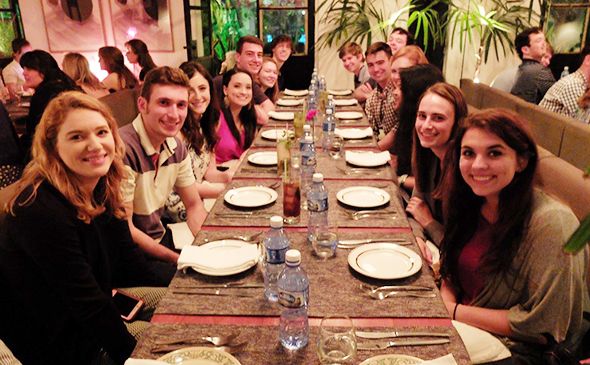Students sample Havana’s business climate on study abroad trip
Twenty students spent their spring break in Havana, Cuba, as part of a new course from Terry’s International Business Programs.
The faculty-led study abroad trip – the first of its kind for the college – exposed students to business and economic conditions in Cuba through discussions with local entrepreneurs and workers, tours and lectures.
“What I enjoyed most about the trip was the opportunity to spend time with the Cuban people. We were able to learn the truth of their situation, while seeing how recent improvements in the relations between our two countries have positively affected them,” said MAcc student Antonio De Quesada, whose family immigrated from Cuba before he was born. “Even walking through the streets of Old Havana, I could feel a sense of welcoming from the people. I enjoyed the fact that the Cuban people absolutely seem open to normal relations between Cuba and the United States, regardless of our respective governments’ attitudes.”
De Quesada was the first member of his family to return to the island since their departure in 1962.
“While I have a deep personal connection to what has happened there over the past 60 years or so, I knew that I never would be able to completely understand the issues until I saw them for myself,” he said. “While a lot of what I saw was encouraging, I was shocked at how far behind Cuba is in some areas, such as Wi-Fi connectivity and television.”
Like De Quesada, this was the first trip to Cuba for most students, but that didn’t mean they were unprepared for the experience. The course, taught by Tim Samples, assistant professor of legal studies, required lots of reading and coursework before, during and after spring break.
“The class was concerned with the business climate in Cuba and the direction of the economic and legal reforms with an eye toward understanding how international business works,” Samples said. “We met with entrepreneurs, economists, lawyers, journalists, people who are running tech startups and tobacco farms. We got as broad a panorama and as deep an understanding as we possibly could.”
Before the trip, students were required to study and create presentations that reflected their readings. The experiential learning course culminates with each student writing a final paper enhanced by personal reflection and insight.
“Being a finance and political science double major who is on the pre-law track, I knew that I needed to find a study abroad program that piqued all of my interests,” said Carmen Williams. “Cuba has a unique dichotomy that is an extreme contrast to the norm in the United States, so a study abroad program in Havana was the best option for me to broaden my scope and understanding of the international system.”

